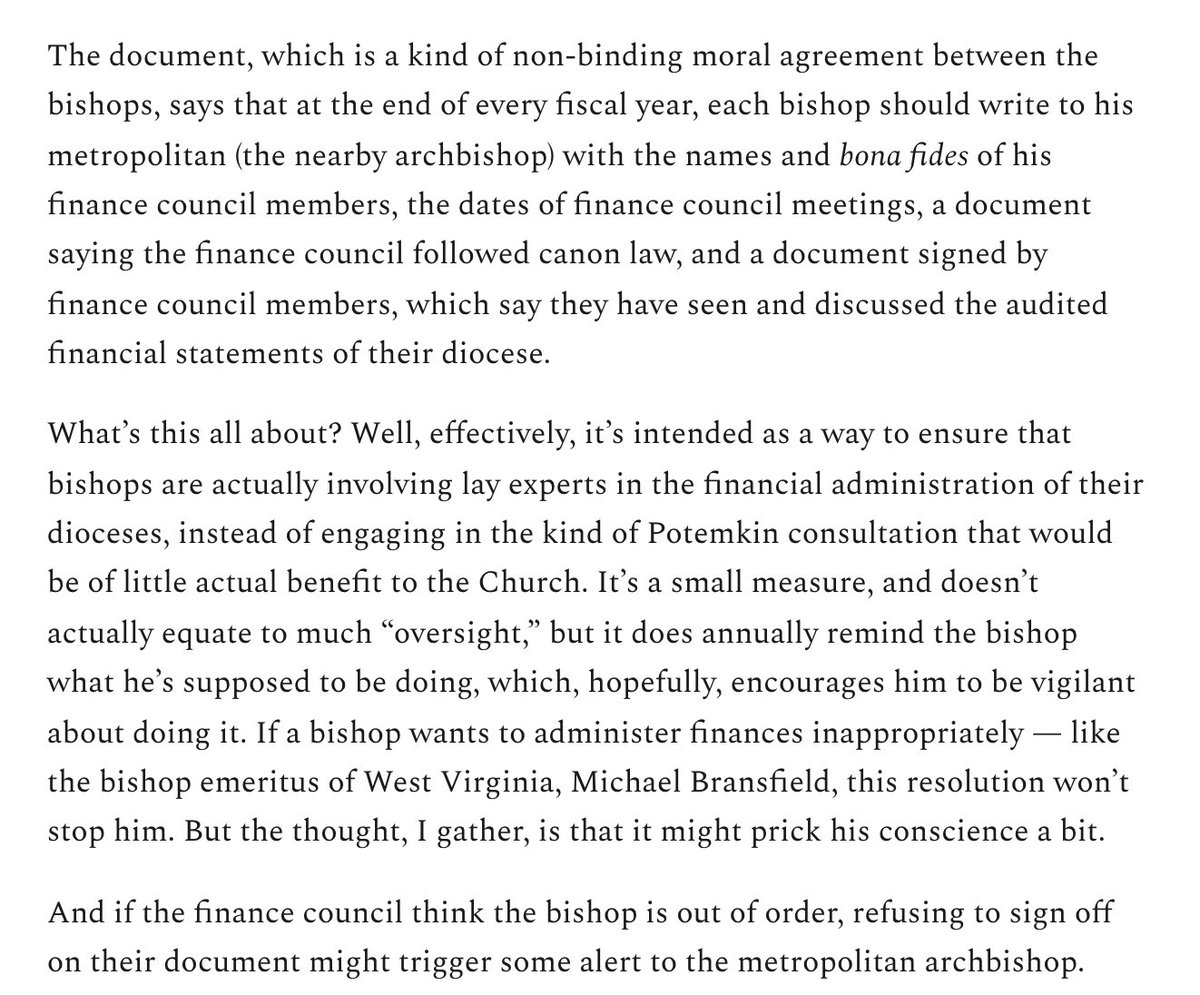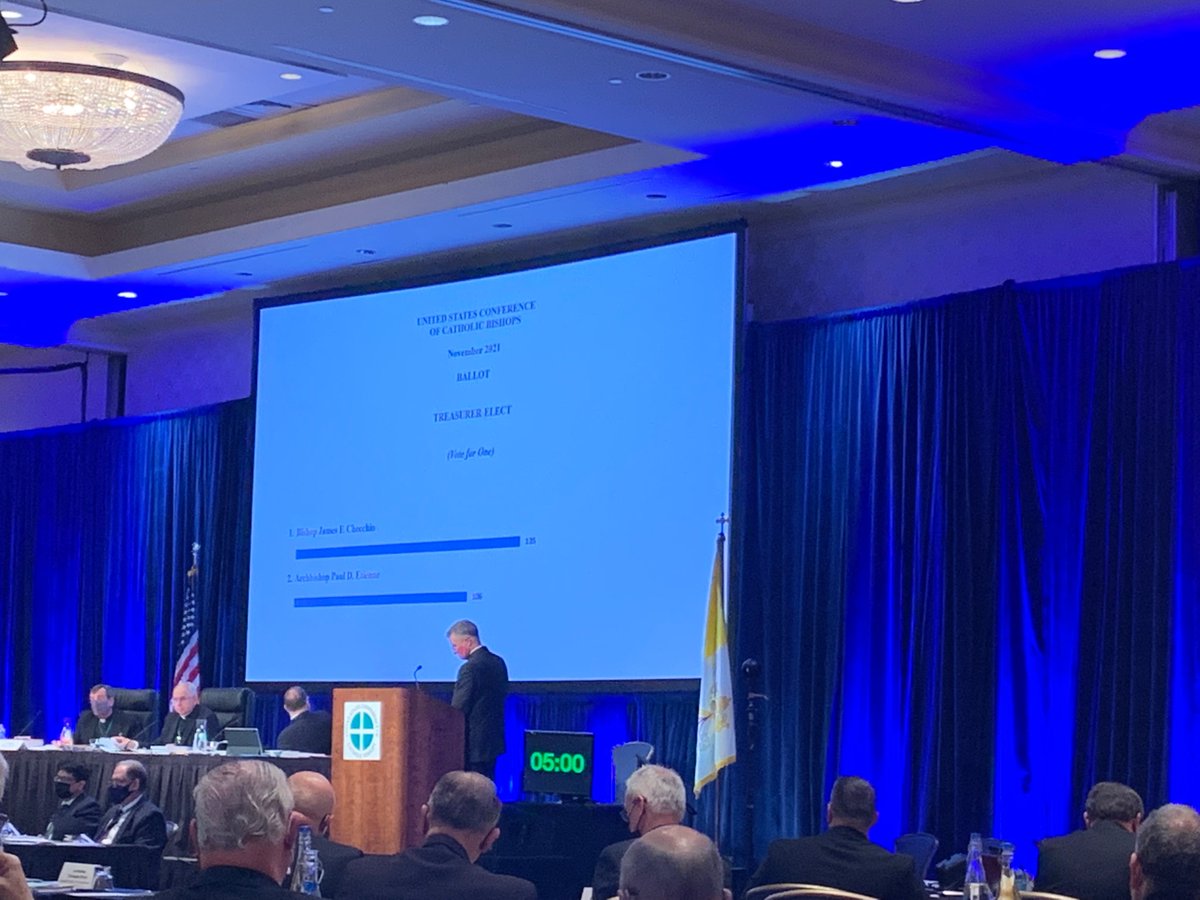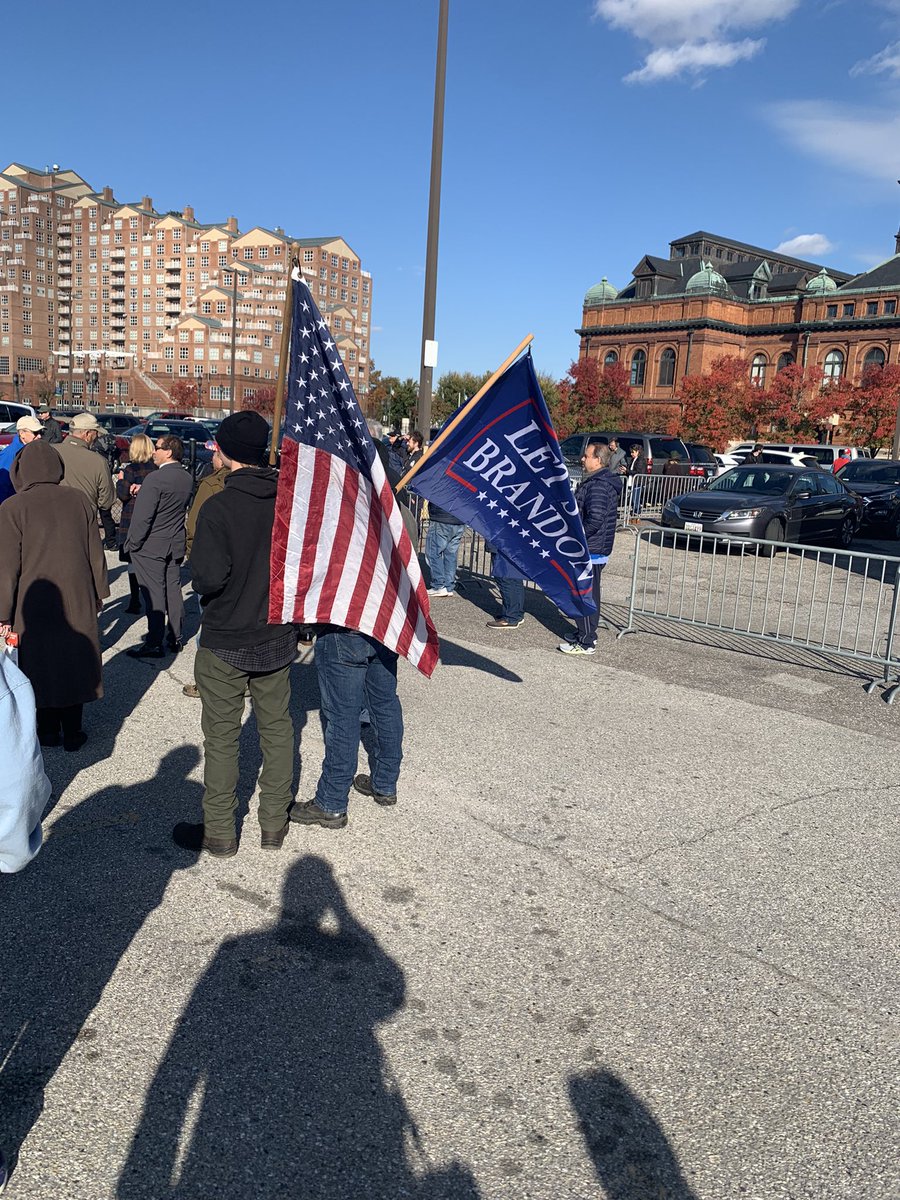
The bishops are now beginning the afternoon session of #USCCB21. So buckle in.
In front of me in the press gallery is @natemup, who runs the @BlkCathStories. It’s a cool journalism project. 

On the agenda today is presentation/discussion of several action items, including *the* Eucharist document. The bps won't vote on those items today, but they will be able, if the meeting follows ordinary practice, to ask questions.
The bps will also elect cmmttee chairs.
The bps will also elect cmmttee chairs.
+Gomez: First +Molloy will present (on behalf of +Parkes, who is ill) on some finance/budget items.
+Malloy will present revised "Socially Responsible Investment Guidelines," which were developed with the help of many committees of the USCCB and other consultants.
#USCCB21
#USCCB21
+Malloy:
guidelines were 20 yrs old. Updated with responses to new economic areas (technology, communications, etc), reflect insight from Ben XVI and Pope Francis, and also surveyed bps on their views.
#USCCB21
guidelines were 20 yrs old. Updated with responses to new economic areas (technology, communications, etc), reflect insight from Ben XVI and Pope Francis, and also surveyed bps on their views.
#USCCB21
+Malloy:
Bps can propose amendments which will be considered for possible inclusion.
Now time for questions.
Bps can propose amendments which will be considered for possible inclusion.
Now time for questions.
+McElroy:
It seems wise to me that the document includes several approaches -- sometimes the ocnference says we won't own any stock b/c of some issue, some times we'll try to change companies, etc.
Among the menu of stances, the weakest one is taken for fossil fuels. Why?
It seems wise to me that the document includes several approaches -- sometimes the ocnference says we won't own any stock b/c of some issue, some times we'll try to change companies, etc.
Among the menu of stances, the weakest one is taken for fossil fuels. Why?
+Malloy:
There are various levels of exhortation the guidelines allow for in response to the activity of companies. The effort, as per Pope Francis, is to try to give strong pointers to investment advisers, but it is not possible for advisers to achieve full and complete end.
There are various levels of exhortation the guidelines allow for in response to the activity of companies. The effort, as per Pope Francis, is to try to give strong pointers to investment advisers, but it is not possible for advisers to achieve full and complete end.
+Malloy:
With fossil fuels, the committee decided to give investors guidance [that we mgiht try to influence company policy] but...that's what the committee decided.
With fossil fuels, the committee decided to give investors guidance [that we mgiht try to influence company policy] but...that's what the committee decided.
+Soto: When will we review these again? Given what +McElroy said.
+Malloy: Every three years.
#USCCB21
+Malloy: Every three years.
#USCCB21
+Tyson: Is the Holy See developing investment guidelines?
+Malloy: I've heard that, but...we're not sure.
+Tyson: But if they do, we'd change our policies to reflect them?
+Malloy: We'd work with them when they came out.
+Malloy: I've heard that, but...we're not sure.
+Tyson: But if they do, we'd change our policies to reflect them?
+Malloy: We'd work with them when they came out.
NOW, +Listecki will present changes to the statutes of the catechumentate in English and Spanish, and also a Resolution on Diocesan Financial Reporting.
+Listecki:
Our statutes on the catechumenate were approved in 1986. But we have 40 yrs of experience. We've "learned much." CARA did a study on the implementation of the statutes, and we've learned some things.
New statutes contain fewer norms.
Our statutes on the catechumenate were approved in 1986. But we have 40 yrs of experience. We've "learned much." CARA did a study on the implementation of the statutes, and we've learned some things.
New statutes contain fewer norms.
+Listecki:
New norms downsize the number of norms to be on par with universal law.
-- by the way, here are the current norms on the catechumenate:
lacatholics.org/wp-content/upl…
New norms downsize the number of norms to be on par with universal law.
-- by the way, here are the current norms on the catechumenate:
lacatholics.org/wp-content/upl…
+Listecki:
Our committee thinks we need to address some issues, including the marriage of catechumens, and investigating putative baptism of non-Catholics. But we're going to cut those out of the statutes and develop some additional resources.
Our committee thinks we need to address some issues, including the marriage of catechumens, and investigating putative baptism of non-Catholics. But we're going to cut those out of the statutes and develop some additional resources.
+Listecki:
We have new statutes that outline the prerogatives of catechumens. Also, a new statute that says catechumens can't go through the rite of election if they are in an irregular marriage and not free to attempt marriage.
(JD note: This is what I'll be asking a ? l8er.)
We have new statutes that outline the prerogatives of catechumens. Also, a new statute that says catechumens can't go through the rite of election if they are in an irregular marriage and not free to attempt marriage.
(JD note: This is what I'll be asking a ? l8er.)
+Listecki now presenting the same guidelines in Spanish.
There are no questions.
There are no questions.
Now Listecki presenting the "Resolution on Diocesan Financial Reporting" - a resolution that must be renewed every five years:
usccb.org/about/financia…
#USCCB21
usccb.org/about/financia…
#USCCB21
NOW +Blair will present translations to be voted upon:
-"Holy Communion and Worship of the Eucharistic Mystery Outside Mass"
-revised English and Spanish editions of the Order of Christian Initiation of Adults for use in the dioceses of the United States of America
-"Holy Communion and Worship of the Eucharistic Mystery Outside Mass"
-revised English and Spanish editions of the Order of Christian Initiation of Adults for use in the dioceses of the United States of America
+Blair- one small note. We will vote on the inscription of Saint Teresa of Calcutta on the Proper Calendar for the Dioceses of the United States of America (Sept 5.) one hangup will be that a collect in the Spanish text needs to be revised. So...just fyi.
+Blair:
"Holy Communion and Worship of the Eucharistic Mystery Outside Mass" in the Latin editio typica is fairly flexible. Eg, there are a lot of variations of the Divine Praises.
"Holy Communion and Worship of the Eucharistic Mystery Outside Mass" in the Latin editio typica is fairly flexible. Eg, there are a lot of variations of the Divine Praises.
+Blair:
Conferences have the authority to include texts reflective of traditional form of celebration of benediction and exposition with their translations. So for the sake of unity, we are doing so, even while the editio typica does allow a fair amount of variability.
Conferences have the authority to include texts reflective of traditional form of celebration of benediction and exposition with their translations. So for the sake of unity, we are doing so, even while the editio typica does allow a fair amount of variability.
+Blair:
Also a revised English edition of the RCIA book.
The book we've been using the 80s reorders and supplements the Latin extensively to make it more "user friendly." In 2019, liturgy committee proposed a two stage update:
1. ICEL translation approved editio typica.
Also a revised English edition of the RCIA book.
The book we've been using the 80s reorders and supplements the Latin extensively to make it more "user friendly." In 2019, liturgy committee proposed a two stage update:
1. ICEL translation approved editio typica.
+Blair:
2. Now we are proposing reordering the ICEL translation to make it consistent with the book we've been using.
Also, we've clarified the terminology to distinguish between people at different stages of Christian initiation.
2. Now we are proposing reordering the ICEL translation to make it consistent with the book we've been using.
Also, we've clarified the terminology to distinguish between people at different stages of Christian initiation.
+Blair:
Combined rites of Easter Vigil are now more "ecumenically sensitive," by recognizing the validity of baptism celebrated in other Christian traditions.
+Blair - this is amendable. Also, there is also a Spanish-language version, which is a distinct action item.
Combined rites of Easter Vigil are now more "ecumenically sensitive," by recognizing the validity of baptism celebrated in other Christian traditions.
+Blair - this is amendable. Also, there is also a Spanish-language version, which is a distinct action item.
+Blair: Approving either text requires 2/3 of Latin Church members and confirmation by the Congregation for Divine Worship.
There are no questions.
#USCCB21
There are no questions.
#USCCB21
+Blair:
Current Spanish-language version of RCIA was approved in 1990s. What is being proposed now is NOT a new translation, but an updating to make it consistent with the pending current English language text.
#USCCB21
Current Spanish-language version of RCIA was approved in 1990s. What is being proposed now is NOT a new translation, but an updating to make it consistent with the pending current English language text.
#USCCB21
No questions for +Blair.
Amendments due by 6 pm tonight.
Amendments due by 6 pm tonight.
+Rhoades:
In Nov. 2020, our 2021-24 strategic plan was approved with a focus on the Eucharist. Our committee on doctrine agreed to develop a doc on the Eucharist, which was approved in June 2021. Then we got feedback from regional meetings -- we got more than 100 pp of feedback.
In Nov. 2020, our 2021-24 strategic plan was approved with a focus on the Eucharist. Our committee on doctrine agreed to develop a doc on the Eucharist, which was approved in June 2021. Then we got feedback from regional meetings -- we got more than 100 pp of feedback.
+Rhoades:
Goal is a catechetical document concerning the fundamental doctrines of the Eucharist. It is clear that many Catholics do not have strong catechesis on the Eucharist.
Goal is a catechetical document concerning the fundamental doctrines of the Eucharist. It is clear that many Catholics do not have strong catechesis on the Eucharist.
+Rhoades:
Part of that catechesis is a call to respond to gift of Ecuharist through ongoing conversion and missionary discipleship.
It is intended to be a doctrinal resources for parishes, catechists and the faithful.
Part of that catechesis is a call to respond to gift of Ecuharist through ongoing conversion and missionary discipleship.
It is intended to be a doctrinal resources for parishes, catechists and the faithful.
+Rhoades: I will now take questions.
(I actually expect few, because they're having all these executive sessions to talk about it)
(I actually expect few, because they're having all these executive sessions to talk about it)
+Baldacchino of Las Cruces:
I really appreciate the content of this document. If I may -- what we've been hearing is that we need to bring it to the language of the people. There is little mention of the Paschal Mystery -- perhaps once or twice.
I really appreciate the content of this document. If I may -- what we've been hearing is that we need to bring it to the language of the people. There is little mention of the Paschal Mystery -- perhaps once or twice.
+Baldacchino:
The Paschal Mystery refers to the Passover. It is an event. An experience. Many times I feel that the brilliance of the sun of the Resurrection is clouded by the language that we use.
This is an event. The Passover is an event -- an experience.
The Paschal Mystery refers to the Passover. It is an event. An experience. Many times I feel that the brilliance of the sun of the Resurrection is clouded by the language that we use.
This is an event. The Passover is an event -- an experience.
+Baldacchino:
People struggling, in need of Jesus, are invited to an event called the Paschal Mystery. The Passover. Invited into the Resurrection.
For consideration, I suggest we bring it to people in that way.
People struggling, in need of Jesus, are invited to an event called the Paschal Mystery. The Passover. Invited into the Resurrection.
For consideration, I suggest we bring it to people in that way.
+Stika:
It's a teaching document. A beautiful document. But I am curious: I've read that children in fifth grade begin to make decisions about faith. Fifth graders, high schoolers, even college kids won't understand this document. So...how will this be translated into catechesis?
It's a teaching document. A beautiful document. But I am curious: I've read that children in fifth grade begin to make decisions about faith. Fifth graders, high schoolers, even college kids won't understand this document. So...how will this be translated into catechesis?
+Stika:
We need to address these things very early in grade school. That's important, or else we will have another lost generation. Documents are often ignored.
We need to address these things very early in grade school. That's important, or else we will have another lost generation. Documents are often ignored.
+Rhoades: Yeah. The document is meant for adults. But it could work in high school with some catechetical resources. It's not for grade schoolers, but this could be a resource for catechetics publishers in developing a resource for children.
+Estevez:
1976 International Eucharistic Congress in Philly was a great event. One thing that happened there was a session to connect the realities of the human family connected to the Eucharist. It was great. Could we mention it in the document?
1976 International Eucharistic Congress in Philly was a great event. One thing that happened there was a session to connect the realities of the human family connected to the Eucharist. It was great. Could we mention it in the document?
+Rhoades:
I like that suggestion. The 1976 Eucharistic Congress had a big impact on my vocation. I was a college freshman. So feel free to submit an amendment.
I like that suggestion. The 1976 Eucharistic Congress had a big impact on my vocation. I was a college freshman. So feel free to submit an amendment.
+Doherty:
We are trying to make a text, but if we could do everythign in a text, "we would not need music, poetry, dance, visual arts, or architecture." So in a liturgical context, the text can only do so much. We might want to remind people that language fails at a certain point
We are trying to make a text, but if we could do everythign in a text, "we would not need music, poetry, dance, visual arts, or architecture." So in a liturgical context, the text can only do so much. We might want to remind people that language fails at a certain point
+Doherty:
As liturgists often remind me, music and dance are also important to expressing and experiencing our faith.
#USCCB21
As liturgists often remind me, music and dance are also important to expressing and experiencing our faith.
#USCCB21
No other comments (I told you -- that's what they've been talking about in executive sessions!!!)
+Gomez: We were supposed to have a break, but let's skip it and vote on committee chairs.
murmurs of approval.
murmurs of approval.
So now we will elect committee chairs. They'll do it by electronic ballot.
Ed and I made some predictions here:
pillarcatholic.com/p/a-day-at-the…
Ed and I made some predictions here:
pillarcatholic.com/p/a-day-at-the…
It usually takes a while for them to practice the voting machine.
anyway, the committee on priorities and plans helps to choose candidates, which are nominated ahead of time.
I heard a rumor there will be a floor nominee, but I hear that rumor every year, so I'm skeptical.
anyway, the committee on priorities and plans helps to choose candidates, which are nominated ahead of time.
I heard a rumor there will be a floor nominee, but I hear that rumor every year, so I'm skeptical.
First up:
Treasurer-elect:
Checchio, of Metuchen
Etiene of Seattle.
they're voting.
Treasurer-elect:
Checchio, of Metuchen
Etiene of Seattle.
they're voting.
Now Clergy, Consecrated Life, and Vocations:
+Aquila vs. Boyea.
They're voting now.
+Aquila vs. Boyea.
They're voting now.
Now for Divine Worship:
+Lopes v. +Rozanski.
+Lopes v. +Rozanski.
Now Domestic Justice and Human Development:
Archbishop Borys Gudziak of the Ukrainian Archeparchy of Philadelphia vs. Bishop Thomas Paprocki of Springfield in Illinois
Archbishop Borys Gudziak of the Ukrainian Archeparchy of Philadelphia vs. Bishop Thomas Paprocki of Springfield in Illinois
Now, Laity, Marriage, Family Life, and Youth
Bishop Robert Barron, auxiliary of Los Angeles vs. Bishop Edward Burns of Dallas
Bishop Robert Barron, auxiliary of Los Angeles vs. Bishop Edward Burns of Dallas
Now Committee on Migration
Bishop Mark Seitz of El Paso vs. Archbishop Thomas G. Wenski of Miami
Bishop Mark Seitz of El Paso vs. Archbishop Thomas G. Wenski of Miami
This was not a large margin. I couldn't see the numbers. They used to say the numbers out loud (pssst, @USCCB)
anyway not a large margin. Lopes won by one vote.
anyway not a large margin. Lopes won by one vote.
• • •
Missing some Tweet in this thread? You can try to
force a refresh

















